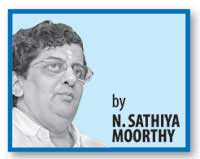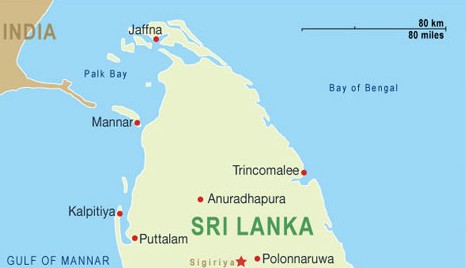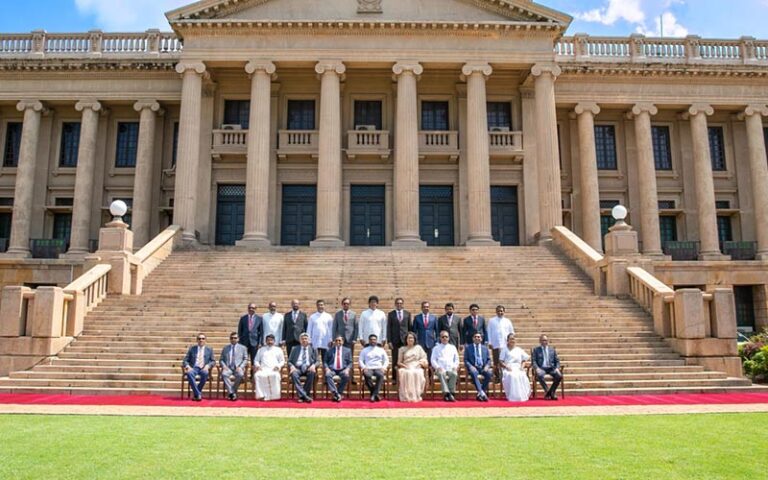 Normally, it should have been termed ‘suicidal’ or hara-kiri tendency. Something is rotten. In contemporary Sri Lanka, the attempts by whoever it is to embarrass the Government and President Mahinda Rajapaksa overseas time and again, and with unfailing periodicity, can be termed only as ‘kola-veri’, taking off from the all-time popular Tamil film song of recent times – and translating as ‘murderous rage’. There is no other way to describe the fiasco that the Commonwealth Economic Forum became for the President, his leadership and the Government, this past week in distant London.
Normally, it should have been termed ‘suicidal’ or hara-kiri tendency. Something is rotten. In contemporary Sri Lanka, the attempts by whoever it is to embarrass the Government and President Mahinda Rajapaksa overseas time and again, and with unfailing periodicity, can be termed only as ‘kola-veri’, taking off from the all-time popular Tamil film song of recent times – and translating as ‘murderous rage’. There is no other way to describe the fiasco that the Commonwealth Economic Forum became for the President, his leadership and the Government, this past week in distant London.
London was the venue for the first of what is now becoming a series of diplomatic fiascos. Around the time when President Rajapaksa could visit the US even when a human rights case was purportedly pending before a local court, he could not deliver a scheduled talk at Oxford Union in the UK, December 2010. The Sri Lankan Tamil Diaspora in that country made sure that the Head of the Sri Lankan State got snubbed after having arrived with the main intention of delivering that address – a second time by a visitor of President Rajapaksa’s stature.
Today, that treatment has been repeated at the more formal Commonwealth Economic Forum. The Commonwealth Business Council, the hosts, cancelled thefull half-day’s programme so as not to embarrass President Rajapaksa and the Sri Lankan State beyond a point. Now, as then, the Scotland Yard, tasked to provide security to the VVIP visitor from a Commonwealth country, had no issues. The saving grace this time was that Queen Elizabeth’s diamond jubilee celebrations, and not President Rajapaksa’s talk was at the centre of his visit. That his key-note address at the Economic Forum was also a part of the celebrations could not be wished away, however.
Nothing much would have been gained for Sri Lanka as a nation or for President Rajapaksa as a leader by his addressing the Oxford Union, then, and the Commonwealth Economic Forum, now. It was not about diplomacy, not even about attracting investments in the post-war period. There are other forums and methods where the President and his Government have said enough and have also received approving nods, depending on issues, moods and methods. Here, the Government’s method failed once again, and the mood of its adversaries took over.
In contrast, the failure for the Government time and again, whether in the UK or elsewhere, is a victory for the adversaries, the Sri Lankan Tamil Diaspora groups, still bent on destroying Colombo’s credibility in the eyes of the international community. No cost-benefit analysis seemed to have been done in Colombo before someone thought about canvassing for the President to address the Economic Forum, not long after the Geneva vote in particular. Nor had anyone seemed to have worked out the worst-case scenario this time either, particularly in the context of the Oxford Union fiasco, a full year and a half earlier.
It was a similar strategy that cost Sri Lanka dearly at Geneva. Scape-goats have since been found nearer home and afar. The fact that the unbending approach adopted since the commencement of the Geneva campaign meant that there was no room for diplomacy at any level. What friendly nations thus offered too was unilateral – but not asked for, through tact and diplomacy. Then again, the Government did not seem to have worked out a worst-case scenario. It then became too late for Colombo to reverse the trend and the mood of those who had committed to vote with Sri Lanka almost from the word, ‘Go’.
Post-Geneva, External Affairs Minister G L Peiris seemed to have done a decent job with his American interlocutors in Washington on issues emanating from the ethnic question, LLRC Report, et al. They included the US Secretary of State Hillary Clinton, Senators and other politicians, policy-makers and the American strategic community at large. Some of the sheen from that low-profile, limited success on the diplomatic front, might have been lost now, thanks to the high-profile event across the Atlantic that was not to be. Diplomacy is all about the former, albeit through proxy, even where the Head of State is involved. Politics is about publicity. Diplomacy produces results, publicity, only symbols, not even signals at times.
There was no debating-point for President Rajapaksa to score either on the domestic front or overseas by delivering what essentially would have been an insipid talk in context. It would not have gone down with the celebratory mood of the Queen’s fete. It is another matter why and how the Diaspora Tamils and their political backers in the UK were allowed to walk away with a sense of self-righteousness that they could spoil the host nation’s party at will – and could have spoiled it even more if President Rajapaksa had delivered his address at the Economic Forum!
For a long time to come, the rest of the world would remember London, June 2012, for the Queen’s Diamond Jubilee, the flotilla on the Thames and a nation in partying mode over a long week-end. Sri Lanka will remember it for very wrong reasons. So would it remember the word Oxford and Geneva – and, all for equally wrong reasons! If nothing else, there is something here also for the critics and adversaries of President Rajapaksa to gloat over, nearer home, too – possibly, reading the stars and predicting the future (as they have done over these past years, too!).
Sri Lanka’s problems are internal. It suits the Diaspora to externalise it in every which way, to expand the scope so that it ended up without a solution, to one or the many facets that appear at inevitable intervals. For the Government to play the game has proved that it’s only playing somebody else’s game, and not its own. In cricket, it is hit-out, in football, same-side goal. So much so even a positive action of the Government in having reduced the armed forces personnel in the northern Jaffna Peninsula from a high 50,000 to less than a third, at 15,000, has gone mostly unnoticed. So has the land in military occupation in the North shrunk by 40 per cent, we are told.
Why the Government had shied away from publicising these figures earlier is anybody’s guess. It is here that the Government’s efforts, not excluding propaganda efforts, should be, and should have been concentrated. It is another matter how the number adds up for the rest of the Northern Province, and possibly for the East, too, is unclear as yet.
President Rajapaksa is not tired of saying that for what essentially is a domestic problem, Sri Lanka needed a home-grown solution. There is thus no meaning in the Government going around, wanting to convince the world outside when it should be talking and convincing the Tamil community and the larger Sinhala polity, instead. There is a lot of dithering on that score, in turn sending out confusing signals at best from Colombo to the rest of the world capitals.
In recent days, TNA’s Sivajilingam sort of exposed the Diaspora, saying that they offered only words, not development funds, or investments. Tamil National Alliance leader R Sampanthan has since replaced his combative mood of the previous weeks, as reflected in his ITAK convention speech at Batticaloa with a compromising posture – expressing willingness still, for going back to the negotiations table.
The Government has to seize this opportunity and move forward. The rest of the world can wait. With a solution in sight, the world would also then wait on Sri Lanka – the Oxford Union and the Commonwealth Forum included!
Source: Daily Mirror (Sri Lanka)




